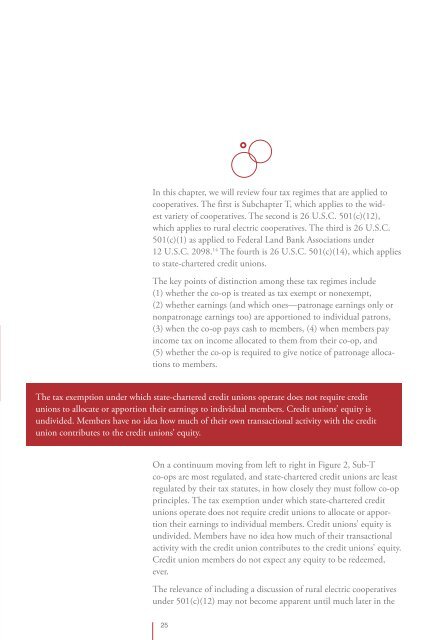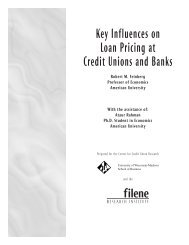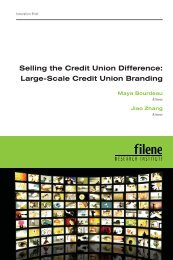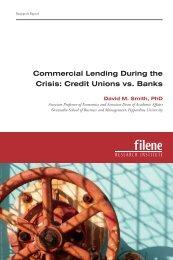Credit Union and Cooperative Patronage Refunds - Filene ...
Credit Union and Cooperative Patronage Refunds - Filene ...
Credit Union and Cooperative Patronage Refunds - Filene ...
You also want an ePaper? Increase the reach of your titles
YUMPU automatically turns print PDFs into web optimized ePapers that Google loves.
In this chapter, we will review four tax regimes that are applied to<br />
cooperatives. The first is Subchapter T, which applies to the widest<br />
variety of cooperatives. The second is 26 U.S.C. 501(c)(12),<br />
which applies to rural electric cooperatives. The third is 26 U.S.C.<br />
501(c)(1) as applied to Federal L<strong>and</strong> Bank Associations under<br />
12 U.S.C. 2098. 14 The fourth is 26 U.S.C. 501(c)(14), which applies<br />
to state- chartered credit unions.<br />
The key points of distinction among these tax regimes include<br />
(1) whether the co-op is treated as tax exempt or nonexempt,<br />
(2) whether earnings (<strong>and</strong> which ones—patronage earnings only or<br />
nonpatronage earnings too) are apportioned to individual patrons,<br />
(3) when the co-op pays cash to members, (4) when members pay<br />
income tax on income allocated to them from their co-op, <strong>and</strong><br />
(5) whether the co-op is required to give notice of patronage allocations<br />
to members.<br />
The tax exemption under which state-chartered credit unions operate does not require credit<br />
unions to allocate or apportion their earnings to individual members. <strong>Credit</strong> unions’ equity is<br />
undivided. Members have no idea how much of their own transactional activity with the credit<br />
union contributes to the credit unions’ equity.<br />
On a continuum moving from left to right in Figure 2, Sub-T<br />
co-ops are most regulated, <strong>and</strong> state- chartered credit unions are least<br />
regulated by their tax statutes, in how closely they must follow co-op<br />
principles. The tax exemption under which state- chartered credit<br />
unions operate does not require credit unions to allocate or apportion<br />
their earnings to individual members. <strong>Credit</strong> unions’ equity is<br />
undivided. Members have no idea how much of their transactional<br />
activity with the credit union contributes to the credit unions’ equity.<br />
<strong>Credit</strong> union members do not expect any equity to be redeemed,<br />
ever.<br />
The relevance of including a discussion of rural electric cooperatives<br />
under 501(c)(12) may not become apparent until much later in the<br />
25








